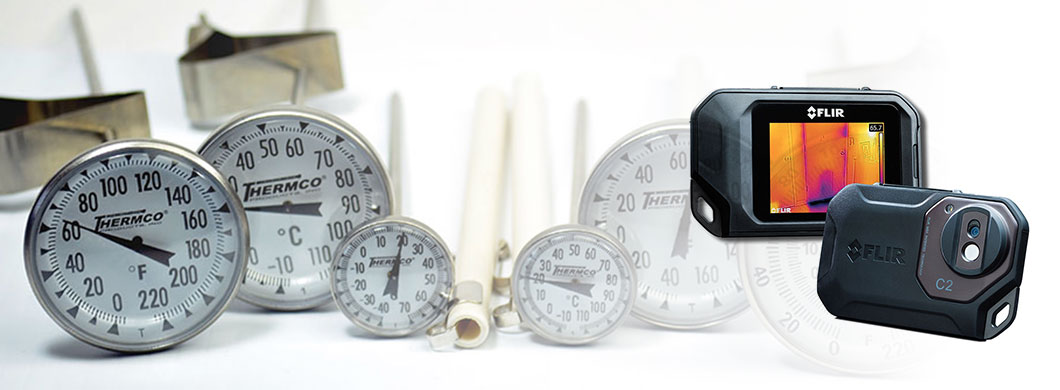Certified Thermometers for Material Testing
Sep 18, 2017
Not all certified thermometers for material testing are sufficiently accurate for some quality assurance tests that involve concrete construction. But they do make it possible to estimate concrete temperatures without interfering with the concrete placements.
When recording the thermometric temperature of concrete and asphalt; you'll first have to decide on what kind of certified thermometer will best suit your particular material testing requirements.
There are many different types of certified thermometers available in today's market. But before making a purchase, it's critical that you make yourself aware of the array of products that are available. It's also important to understand and take into consideration what each type of thermometer is suitable for in different kinds of uses and environments.
At Certified Material Testing Products, we believe that it's necessary to choose the right thermometer to accommodate its intended application.
This article provides helpful insight involving non-mercury thermometers, mercury thermometers, digital infrared thermometers, and user guidance to make your concrete construction project a success. So let’s take a glimpse at several different thermometers and their ideal uses.
Mercury Thermometers
Glass mercury thermometers are highly suitable for general laboratory tests, material testing for asphalt, and concrete testing. Mercury thermometers were once known as one of the most common thermometers for material testing purposes. Praised for their ability to measure extreme temperature ranges and their high level of accuracy.
For the past two decades, numerous federal, state, and local agencies have classified mercury as hazardous, and extremely toxic. Due to the risks, non-mercury alternatives began to rise in utilization and technological advancements. Nevertheless, there are still some laboratory testing methods that still explicitly utilize mercury thermometers for specialized applications.
As there are ongoing restrictions, we fully urge anyone to check for regulations in their municipality and state before ordering a mercury thermometer.
Mercury thermometers are quite delicate, and need handling with care. A mercury thermometer should be kept in a dry area, especially when precipitation falls. Any contact with water can permanently damage the thermometer, so it's best to keep it out of contact from any weather conditions involving rain.
Non-Mercury Thermometers
With the growing pervasiveness of mercury thermometer bans, came to a need within the materials and laboratory testing industries for alternative goods to record and measure temperatures.
There was a substantial incentive for federal and state agencies to revise standards to align with mercury-free materials testing. Companies that control such criteria continue to standardize, and study non-mercury alternatives that are safer to handle, are reliably calibrated, and provide accurate temperature values.
The Environmental Protection Agency administers many informational resources on alternative temperature measuring devices, and a list of revised ASTM standards for testing with mercury-free thermometers.
Non-mercury thermometers provide the same performance as a typical mercury thermometer, but use a liquid formula which is non-caustic, non-toxic, and biodegradable.
Digital Infrared Thermometers
Digital infrared thermometers are built to support the requirement for temperature monitoring in mostly any setting including asphalt and concrete industry environments.The digital thermometer enables you to set the temperature of the concrete as it arrives on-site and a digital infrared thermometer can extend the latest advances in capabilities that are not available in LiG thermometers. Digital thermometers do more than display and measure temperature; many can log time-stamped data, record max and minimum temperatures, and connect with a computer to analyze data-driven details.
The transparent LCDs offer an excellent resolution of a temperature reading, and thermometer units come in a range of sizes and shapes to allow easy measurements for any environment.
As with non-mercury thermometers, their digital counterparts offer accuracy, reliability, and precision; meeting the various standard testing techniques as alternatives to mercury temperature measurements. In addition, digital thermometers have no restrictions in use because they contain zero hazardous ingredients.
Finding The Right Certified Thermometer
When you’re choosing a certified thermometer, it is noteworthy to understand how it operates. Specifications such as accuracy, resolution, and temperature measurement range will affect how the thermometer functions and operates.
Various environmental circumstances can intervene with the instrument and should be taken into consideration before going ahead, and using any new material testing thermometers on the field.
Why Should You Choose Certified MTP?
When you are working with asphalt, and concrete you may have to carry out some tests to guarantee it meets the required standards. Construction teams use certified thermometers to reduce budgets and satisfy project requirements for maturity monitoring, and temperatures. Here at Certified MTP, we have a range of professional products that are ideal for ensuring you get speedy and accurate results. Shop at Certified MTP for all of your material testing needs today!

